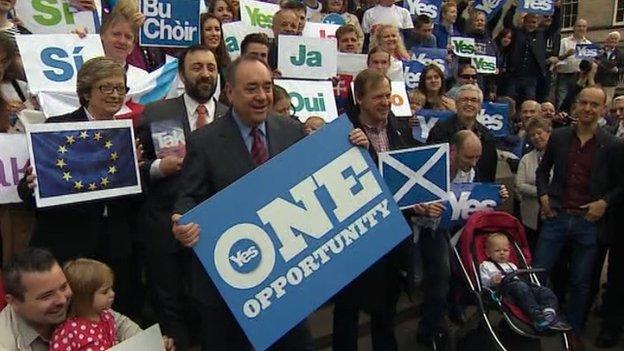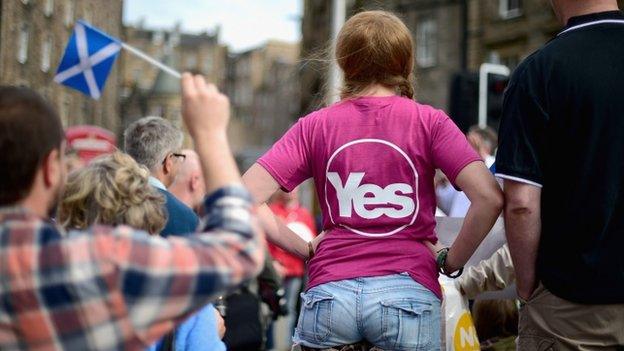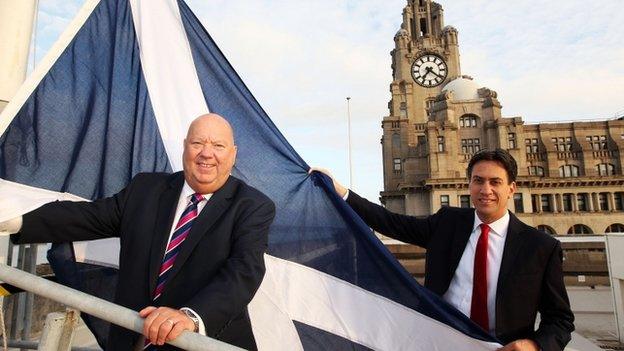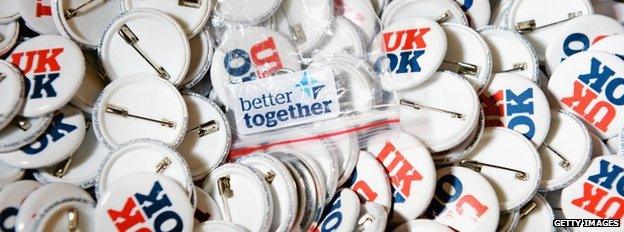Scottish independence: Pro-Union parties back Scotland powers timetable
- Published
- comments
Scottish leaders of the three main pro-Union parties announce their backing for more powers for Scotland in a No vote
The Scottish leaders of the three main pro-Union parties have announced their backing for more powers for Scotland.
After the statement, Prime Minister David Cameron and Labour leader Ed Miliband said they were skipping Wednesday's PMQs and heading to Scotland.
The Scottish Labour, Tory and Lib Dem leaders had stood shoulder-to-shoulder to endorse a timetable for change.
First Minister Alex Salmond said the "No" campaign had "fallen apart".
Scottish Labour leader Johann Lamont; Scottish Conservative leader Ruth Davidson and Scottish Liberal Democrat leader Willie Rennie have backed the plan of action spearheaded by former prime minister Gordon Brown.
The announcement at the Dynamic Earth museum in Edinburgh came as a new poll suggested there was very little between the two sides in the Scottish independence referendum campaign.
'Voting for change'
Ms Lamont said: "It is possible to vote 'No' on 18 September and also say you are voting for change, for more powers for the Scottish Parliament."
She added: "We all have our political arguments, that's what politics is like, but where we can agree we do agree and what we've said here is that the importance of this debate to the people of Scotland is to give them certainty that there will be more powers.

Alex Salmond attended a "Yes" campaign event in Edinburgh

The latest polls suggest the gap between Yes and No is virtually non existent
Scottish Conservative leader Ms Davidson said Gordon Brown had outlined a plan, which would come into effect in the result of a "No" vote, and Prime Minister David Cameron had endorsed it.
She said: "This is the way that Scotland can have what it wants most of all, which is full control and full levers of power over huge swathes of what we do in this country, how we deliver our public services without having to walk away from the strength and security of the United Kingdom."
Mr Rennie, the Scottish Liberal Democrat leader, said: "All three parties are coming together as this is so important."
First Minister Alex Salmond says the pro-Union leaders backing more powers after a "No" vote is the "disintegration of the 'No' campaign"
He added: "We are going to commit to delivering on more taxation and more welfare, that's the commitment that we are standing here to give - certainty to people in Scotland that they know, if they vote 'No' in September, it will lead to more radical change right across Scotland."
Speaking at a Yes Scotland event on the Royal Mile in Edinburgh, the first minister said: "I think it is a very significant day in the referendum campaign. This is the day the 'No' campaign fell apart at the seams."
Mr Salmond said the plan unveiled by Mr Brown and backed by the Scottish party leaders was "a retreading, a repackaging, a re-timetabling of what they said in the spring".
BBC Scotland's political correspondent Tim Reid said he understood the three pro-Union parties were to sign up to a pledge that a new Scotland Act - devolving further powers in the event of a "No" vote - would be included in the first Queen's Speech after the 2015 General Election.

In other developments:
Labour leader Ed Miliband has urged Labour councils to fly the Saltire to show their support for Scotland remaining in the Union. He joined the Mayor of Liverpool, Joe Anderson, to fly the Scottish flag from a council building in the city.
On the campaign trail in Scotland, Deputy First Minister Nicola Sturgeon joined anti-poverty campaigner and Labour member Bob Holman in the east end of Glasgow, where she insisted a "Yes" vote could create a fairer Scotland. Mr Holman took UK Work and Pensions Secretary Iain Duncan Smith around Easterhouse in 2002, when the Conservative MP was leader of his party.
Better Together leader Alistair Darling was joined by First Minister of Wales Carwyn Jones, who made a speech in Edinburgh about the benefits of devolution within the UK.

The latest TNS poll showed that of all the adults surveyed, 39% were backing a "No" vote, 38% a "Yes" vote and 23% were undecided.
Of those who said they were sure to vote, the "Yes" and "No" camps were neck and neck at 41% with 18% undecided.
Yes Scotland described the poll as "another breakthrough" while Better Together said it showed there was "no room for a protest vote".
The poll of 990 people was conducted between 27 August and 4 September.

Ed Miliband has urged Labour councils to fly the Saltire
The Scottish leaders of the pro-Union parties endorsed the timetable which was set out by Mr Brown in a speech at the Loanhead Miners Welfare and Social Club in Midlothian on Monday evening, the main points of which are:
Work to begin on the new legislation on 19 September, the day after the referendum
A "command paper" to be published by the present UK government setting out all the proposals by end of October
A white paper to be drawn up by the end of November after a period of consultation setting out the proposed powers
A draft for a new Scotland Act to be published in January
A spokesman said Downing Street was "content with the proposed timetable", while Labour leader Ed Miliband said he wanted "the process of further devolution under way right after the referendum".
The three main Westminster parties have all set out individual proposals for more powers for the Scottish Parliament previously.

ECONOMIC ANALYSIS
By Robert Peston, BBC economics editor
"The prime minister last night hosted a party in Downing Street for more than 100 business leaders.
"One of his messages was that they should be more conspicuous in selling to the Scottish people the benefits of remaining in the UK - especially the offer made to Scots yesterday by Gordon Brown, on behalf of the three main anti-independence parties, of greater budget-making and other powers for the Scottish Parliament.
"It tells you much of what you need to know about the fracturing of the UK - and the impairment of the idea that the prime minister represents us all, from the Highlands to Cornwall - that David Cameron has delegated the marketing of this allegedly momentous constitutional reform to his predecessor as prime minister, whose reputation is not unblemished, and to unelected folk who run big companies." Read more....
POLITICAL ANALYSIS
By Nick Robinson, BBC political editor
"The Scottish Parliament already controls the policy and budget of the Scottish NHS but the Yes campaign has argued that Treasury cuts in the grant given to the Scottish government limit it's ability to spend what it wants.
"Also, they claim that NHS privatisation south of the border is designed to shrink the NHS budget in England which will then have a knock-on for the budget in Scotland.
"One of the main underlying causes of the closing of the polls in Scotland has been the switch of Labour voters to supporting Yes driven, at least in part, by the fear that the NHS is under threat from policies being pursued in England." Read more....

Speaking on BBC Radio 4's Today programme, SNP MP Angus Robertson accused the pro-Union parties of offering a "cynical last-minute bribe".
He said: "The big news of the day isn't the reheating of an announcement by Gordon Brown and his allies in the Conservative party, the big news it is that the momentum continues to be with the 'Yes' campaign.
"The 'Yes' side is up six points, the 'No' side is down six and we are seeing massive numbers of voters, especially Labour voters, switching to the 'Yes' side.
"In contrast we have total panic and desperation from the 'No' side, offering a cynical bribe which is utterly transparent to voters in Scotland."
Labour MP Jim Murphy, also speaking on Radio 4, challenged Mr Robertson on whether or not the SNP would be join the debate on Scotland's constitutional if there was a "No" vote in the referendum.
Mr Murphy said: "We want to be really clear that if people vote 'No' they are not voting for no change. Change is coming.
"As a consequence of what Gordon Brown and the Labour party announced last night, agreed with the other parties who seem to support it, the day after the referendum, as the result is announced, if it is a 'No' vote, the House of Commons will have a motion tabled setting out an approach that will bring new and significant powers to the Scottish Parliament at remarkable speed."


Scottish Labour - Its devolution commission, external has backed increased tax-varying powers and control over some elements of welfare and benefits policy. It said MSPs should be able to vary tax by up to 15p, giving them the option of restoring the 50p rate for top earners. They would also be able to cut the 45p rate but only if the basic rate was cut as well.
Scottish Conservatives - Scottish Conservative leader Ruth Davidson has said Scotland should be given full income tax powers, a key recommendation of the party's devolution commission, external, chaired by Lord Strathclyde. The commission, which said the income tax plan would see the Scottish Parliament accountable for 40% of the money it spent, also said there was a case for a share of Scottish VAT receipts being assigned to Holyrood.
Scottish Liberal Democrats - Its commission, chaired by former UK party leader Sir Menzies Campbell, external, proposes a federal structure for the UK. It would give the Scottish Parliament control over financial powers including inheritance tax, capital gains tax, income tax and a good share of corporation tax. It also called for the devolution of new borrowing powers; new Partnership Powers to require Holyrood and Westminster to work together; a role for the Supreme Court in resolving disputes and a new needs-based formula to eventually replace the Barnett Formula.

'Utter panic'
Yes Scotland Chief Executive Blair Jenkins said: "The No campaign's empty talk of more powers smacks of utter panic and desperation as they lose their lead in the polls.
"The people of Scotland will not trust the Tories to deliver powers that fall far short of what we need.
"The sure-fire way to achieve the full range of powers Scotland needs to build a fairer society and more prosperous economy is to vote Yes a week on Thursday.
"While the No campaign press the panic button and blame each other for a series of blunders, Yes will get on with the job of persuading more of our fellow citizens - both No and undecided voters - that we need a Yes vote to put Scotland's future in Scotland's hands."
He described the latest TNS poll as "another breakthrough poll which confirms that Yes has the momentum".
Blair McDougall, campaign director for the pro-UK Better Together campaign, said: "The last couple of days will be seen as the moment the referendum got real.
"We know from these polls that there is no room for a protest vote. The vote of any one of us could be crucial and could make the difference between the UK breaking up and staying together."
He added: "We are working flat out to get across our positive vision for Scotland that means we don't need to take on all the risks. There is a better way to build the better nation that we all want.
"We can have more powers for Scotland, backed up by the strength, security and stability of being part of the larger UK."


A referendum on whether Scotland should become independent is to take place
People resident in Scotland will be able to take part in the vote, answering the "yes/no" question: "Should Scotland be an independent country?"
The referendum will take place on Thursday, 18 September 2014
Go to the BBC's Scotland Decides page for analysis, background and explainers on the independence debate
Keep across the latest polls with our interactive guide.